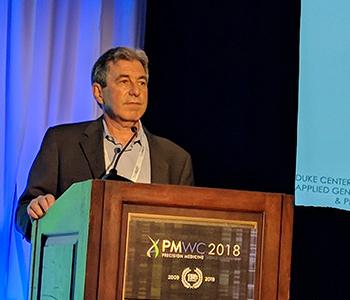
What role should artificial intelligence play in patient diagnosis? How can we best prepare the next generation to make sense of enormous amounts of health-related data?
These were just a few of the questions explored at the 15th Precision Medicine World Conference held at Duke University September 24-25, 2018. This is the second time Duke has hosted the conference. Approximately 420 people attended, representing healthcare and biotechnology institutions from around the world including the National Institutes of Health (NIH), Baylor College of Medicine, Massachusetts Institute of Technology (MIT), Johns Hopkins University, IBM, Regeneron, and the Broad Institute.
Mary E. Klotman, MD, Dean of the Duke University School of Medicine, provided welcome remarks. Former Duke Chancellor of Health Affairs and Dean of the School of Medicine Ralph Snyderman, MD, and Geoffrey Ginsburg, MD, PhD, director of the Duke Center for Applied Genomics and Precision Medicine, served as co-hosts of the event, which drew a national crowd.
“Hosting a conference of this caliber and stature at Duke is consistent with our leadership position in precision medicine,” said Ginsburg. “Duke has been and should continue to be at the vanguard of this field, and this conference not only allows us to shine the light on the many faculty here who are thought leaders in the field but allows for others from around the country to come together and share collective insights into how we should move forward.”
 Michael Pencina, PhD, vice dean for data science and information technology
Michael Pencina, PhD, vice dean for data science and information technologyThis year’s conference featured an eclectic agenda with diverse stakeholders and perspectives along the continuum from discovery to implementation to population health impact. Eleven talks during the conference were given by Duke University faculty members.
Michael Pencina, PhD, vice dean for data science and information technology for the Duke University School of Medicine, talked about the importance of the fusion of biostatistics and machine learning to generate meaningful insights from the large amounts of healthcare data. He likened the huge amount of data available to falling rain and suggested that a true team science approach is necessary to put the data into good use in the same way that rain is captured and utilized in a hydroelectric dam.
“We need to use the data already available to us to truly improve healthcare,” he said. “It is not about machines replacing clinicians but about the integration of cutting-edge technologies to enable creation of the best healthcare system possible.”
 L. Ebony Boulware, MD, MPH, vice dean for translational sciences
L. Ebony Boulware, MD, MPH, vice dean for translational sciencesCathleen Colon-Emeric, MD, MHSc, a professor of medicine and senior fellow in the Center for the Study of Aging and Human Development, spoke about how a better understanding of the underlying mechanisms of biological resilience is needed in order to personalize care for older adults. L. Ebony Boulware, MD, MPH, vice dean for translational sciences in the Duke University School of Medicine, explained the ways in which precision health efforts will need to consider social, environmental and contextual influences on health.
Other Duke speakers included Robert Califf, MD, vice chancellor for health data science and former FDA commissioner; Susanne Haga, PhD, associate professor of medicine; Vandana Shashi, MD, professor of pediatrics; Charles Gersbach, PhD, the Rooney Family Associate Professor of Biomedical Engineering; Svati Shah, MD, associate professor of medicine; and Lawrence David, PhD, associate professor of molecular genetics and microbiology.